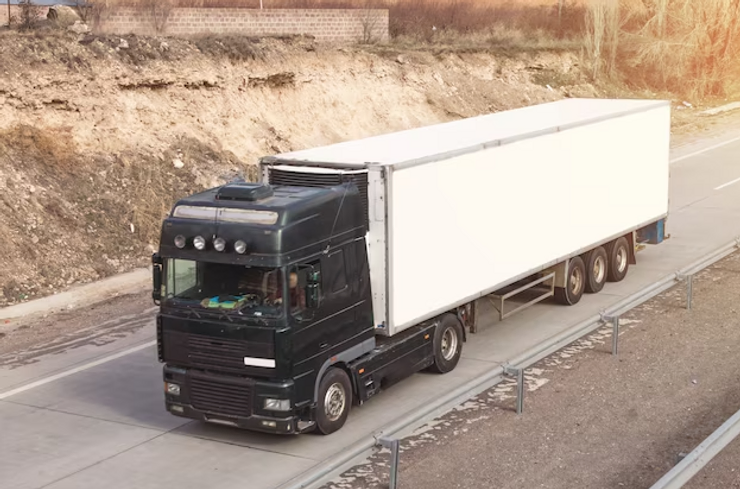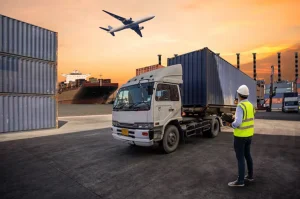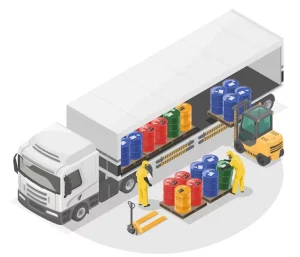In the realm of cargo transportation, two commonly utilized terms are LTL (Less Than Truckload) and FTL (Full Truckload) shipping. These methods serve as the backbone of logistics, offering distinct advantages based on the size and volume of the cargo being transported.
LTL (Less Than Truckload) Shipping:
LTL shipping is a method of transportation where multiple smaller shipments from different shippers are consolidated into a single truckload. Each shipper pays for the space their cargo occupies within the truck, making it a cost-effective option for businesses with smaller shipping volumes.
FTL (Full Truckload) Shipping:
FTL shipping involves dedicating an entire truckload to a single shipment, typically from a single shipper. This method is ideal for larger shipments that require the full capacity of a trailer. FTL shipments travel directly from the origin to the destination without the need for consolidation stops, offering faster transit times and enhanced security.
LTL Freight Shipping: Advantages and Disadvantages
Advantages:
Cost-Effectiveness: LTL shipping is often more cost-effective for small to medium-sized shipments compared to FTL shipping. Since customers only pay for the space their freight occupies within the truck, it can result in significant cost savings, especially for businesses with relatively low shipping volumes.
Flexible Pricing: LTL carriers typically offer flexible pricing structures based on factors such as shipment weight, dimensions, and distance traveled. This flexibility allows businesses to tailor their shipping arrangements according to their specific needs and budget constraints.
Ideal for Small Businesses: LTL shipping is particularly well-suited for small businesses that may not have enough freight to fill an entire truck. By pooling shipments from multiple customers, LTL carriers enable smaller companies to access cost-effective transportation solutions without committing to full truckloads.
Disadvantages:
Longer Transit Times: Due to the multiple stops involved in LTL shipping to accommodate various shipments, transit times can be longer compared to FTL shipping. This may not be suitable for businesses with time-sensitive deliveries or those requiring expedited shipping services.
Risk of Damage or Loss: With multiple handling processes and potential transfers between trucks at terminals, there’s an increased risk of damage or loss during LTL shipments. Fragile or high-value items may be particularly vulnerable to mishandling or accidents along the route.
Limited Control Over Routing: Since LTL carriers consolidate shipments from multiple customers, businesses may have limited control over the routing and delivery schedule. This lack of control can lead to uncertainties in delivery times and may require businesses to plan their logistics more carefully.
In summary businesses should carefully weigh these factors and assess their specific shipping needs to determine whether LTL shipping is the most suitable option for their logistics operations.
FTL Freight Shipping: Advantages and Disadvantages
Advantages:
Direct Route: FTL shipping involves dedicating an entire truck trailer to a single shipment, allowing for a direct route from the pickup location to the destination without intermediate stops. This results in faster transit times compared to LTL shipping, making it ideal for time-sensitive deliveries.
Maximum Capacity Utilization: With FTL shipping, the entire capacity of the truck trailer is dedicated to a single shipment. This maximizes space utilization and is particularly advantageous for large-volume or bulky freight that may not fit efficiently within an LTL shipment.
Predictable Delivery Times: FTL shipping offers more predictable delivery times compared to LTL shipping, as there are fewer variables involved in the transportation process. This reliability is valuable for businesses with strict delivery deadlines or those requiring expedited shipping services.
Disadvantages:
Higher Cost: FTL shipping tends to be more expensive than LTL shipping, especially for smaller shipments or those traveling shorter distances. The cost of dedicating an entire truck trailer to a single shipment can be prohibitive for businesses with limited shipping budgets.
Limited Accessibility: FTL shipping may be less accessible for businesses operating in remote areas or requiring deliveries to locations with limited accessibility for full-size trucks. In such cases, LTL shipping may offer a more viable transportation solution with its broader network coverage.
Risk of Delays: While FTL shipping generally offers faster transit times, delays can still occur due to factors such as traffic congestion, adverse weather conditions, or unforeseen logistical challenges. Businesses relying on FTL shipping for time-sensitive deliveries should account for potential delays in their planning.
What types of cargo can be transported via LTL or FTL shipping?
Both LTL (Less Than Truckload) and FTL (Full Truckload) shipping can accommodate a wide range of cargo types, but each method may be more suitable for certain types of freight based on various factors such as size, weight, fragility, and shipping volume. Here’s an overview of the types of cargo typically transported via LTL and FTL shipping:
LTL Shipping:
Small to Medium-sized Shipments: LTL shipping is ideal for transporting relatively small to medium-sized shipments that don’t require the use of an entire truck trailer. This includes parcels, boxes, pallets, and crates.
Various Industries: LTL shipping serves a diverse range of industries, including retail, manufacturing, e-commerce, healthcare, and automotive. It can accommodate a wide variety of goods, including consumer goods, raw materials, industrial equipment, and perishable items.
Freight with Flexible Delivery Schedules: LTL shipping is suitable for freight with flexible delivery schedules, as shipments may undergo multiple stops and transfers to accommodate various customers along the route.
FTL Shipping:
Large Volume Shipments: FTL shipping is ideal for transporting large volume shipments that require the use of an entire truck trailer. This includes bulky items, oversized equipment, and heavy machinery that may not fit efficiently within an LTL shipment.
High-Value or Fragile Goods: FTL shipping is often preferred for transporting high-value or fragile goods that require dedicated space and minimal handling to reduce the risk of damage or loss. Examples include electronics, artwork, pharmaceuticals, and specialized equipment.
Specialized Cargo: FTL shipping can accommodate specialized cargo types that require specific handling or equipment, such as temperature-sensitive goods (refrigerated or frozen), hazardous materials, and oversized items that require specialized trailers or equipment.
LTL Freight Shipping and FTL Freight Shipping services from Toptrans
At Toptrans, we understand the intricacies of cargo shipping and offer comprehensive services tailored to our clients’ diverse needs. Whether you require LTL or FTL freight shipping, Toptrans stands as your trusted partner in delivering seamless transportation solutions.
With 8 years of industry expertise, Toptrans has established itself as a leading provider of international cargo transportation services. Our deep understanding of global logistics dynamics enables us to deliver tailored solutions that meet and exceed our clients’ expectations.
Diverse Transport Options
Toptrans offers a diverse range of transport options, including land, sea, air, and rail transportation, ensuring seamless connectivity and coverage across various regions. Whether you’re shipping within Georgia or to international destinations, we have the resources and capabilities to handle your cargo with care and efficiency.
Personalized Customer Service
At Toptrans, we prioritize customer satisfaction above all else. Our dedicated team of logistics experts is available around the clock to address your inquiries, provide personalized assistance, and ensure a smooth shipping experience from start to finish. Whether you have questions about LTL vs. FTL shipping or need assistance with a complex shipment, we’re here to help.
LTL and FTL freight shipping services from Toptrans offer versatile solutions to meet your diverse transportation needs. Whether you’re shipping small, medium, or large volumes of cargo, our comprehensive services ensure safe, reliable, and timely deliveries every time. With our commitment to excellence, competitive pricing, and unwavering customer support, Toptrans remains your trusted partner in navigating the complexities of global logistics.








